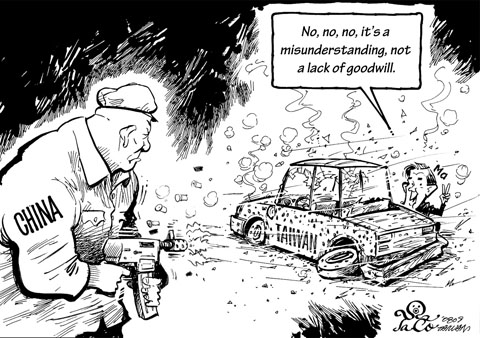US expert
praises Ma’s ‘pragmatic’ PRC policy
STAFF WRITER, WITH CNA
Saturday, Sep 06, 2008, Page 3
“The whole ‘art’ of Ma’s policy and indeed of Hu Jintao’s is to yield nothing
in principle but to try to avoid counterproductively pushing one’s own position
on the other side.” — Alan Romberg, director at Henry L. Stimson Center
President Ma Ying-jeou’s (馬英九) definition of cross-strait ties as “special”
reflects his long-standing pragmatic approach toward China that aims to avoid
confrontation with Beijing on the sovereignty issue, a US expert in cross-strait
affairs said on Thursday.
“Ma is walking a fine line between not accepting the PRC’s [People’s Republic of
China’s] definition of the relationship as ‘domestic’ on the one hand, and not
insisting that cross-strait ties be treated as ‘international’ on the other,”
said Alan Romberg, senior associate and director of East Asian Studies at the
Washington-based Henry L. Stimson Center.
Romberg was commenting on a statement made by Ma during a recent interview with
the leading Mexican daily El Sol de Mexico, in which he defined ties between
Taiwan and China as “special relations” and not “between two states.”
Romberg said that Ma pointed out he is the democratically elected head of
government of a sovereign state, but also spoke of the respective “authorities”
on each side of the Strait because he knew there was no constructive purpose in
insisting that Beijing deals with Taipei as a sovereign government and that
forcing the issue would lead to confrontation.
Chinese President Hu Jintao (胡錦濤) seems willing to take a parallel approach,
while making no compromise in terms of the PRC’s “one China principle,” Romberg
said.
“The whole ‘art’ of Ma’s policy and indeed of Hu Jintao’s is to yield nothing in
principle but to try to avoid counterproductively pushing one’s own position on
the other side,” he said.
Such an approach is seen in the use of the general characterization the
so-called “1992 consensus” by the two sides in handling the question of the term
“one China,” so that they can avoid confronting the differences of definition,
he said.
However, with Ma having repeatedly emphasized the connection between Taiwan’s
“international space” and the quality of cross-strait relations, an important
test of the success of this approach will come on the “international space”
issue, Romberg said.
If China seeks to limit Taiwan’s international participation simply because it
does not want to allow Taipei to have “too much access” to international
organizations in any form, progress in cross-strait ties will inevitably slow
down, he said.
However, if China is only trying to test whether Taiwan really challenges
Beijing on the issue of sovereignty, the opportunity for greater international
participation for Taiwan will open up, given the Ma administration’s willingness
to avoid such challenges, he said.

The need to
speak, at any cost
Saturday, Sep 06, 2008, Page 8
Judiciaries and members of parliament around the world that respect the rule of
law are loath to present commentary to the media on cases that are before the
courts or other investigative bodies.
The reasons for this should be obvious to people with no knowledge of judicial
practice, but in Taiwan, where concepts of due process and natural justice are
quite weak, such behavior does not have the poor reputation that would provoke
an angry response from the legal fraternity.
Public disenchantment with or suspicion toward the law is widespread and
perfectly understandable: It has only been a few years since courts were able to
break free of political manipulation and gradually learn to exercise
independence, consistency and proportionality in their verdicts.
While the judiciary has been spending years gathering the momentum to undertake
reforms that strengthen the rule of law and allow it to apply consistently, the
legislature has all too frequently treated punitive amendments to the law as
their personal playthings — including as weapons to punish rivals or anyone else
if a political jackpot looms.
Now, with a typically cynical line-up of legislators back in town and the latest
batch of Control Yuan officials in place under the Chinese Nationalist Party (KMT)
administration, we are beginning to see omens of regression as far as the law is
concerned.
The Control Yuan, the oversight body shut down for years by the KMT-dominated
legislature over disputed appointments, has among its members a former Taiwan
Solidarity Union legislator, Chien Lin Hui-chun (錢林慧君). Chien Lin, in her zeal
for punishing errant public servants, has suggested a law be introduced that
would strip pensions for certain offenses after an incident involving the former
head of the Investigation Bureau, Yeh Sheng-mao (葉盛茂).
This is despite the fact that, though indicted, Yeh has not been found guilty of
any crime and is yet to be impeached. If Yeh had already been convicted over
allegations that he withheld information from prosecutors relating to former
president Chen Shui-bian’s (陳水扁) finances, Chien Lin’s comments might have been
appropriate.
It is all too easy for Chien Lin, a former politician, to make use of the powers
of oversight and lobbying legislators to make public statements while cases are
in progress.
More worrying is that such language should go unchallenged among Chien Lin’s
colleagues.
Then again, expectations were never very high given that President Ma Ying-jeou
(馬英九) appointed the former leader of a fringe political party to the Control
Yuan’s top post.
Ma’s much vaunted legal expertise will amount to naught if he ends up being
responsible for selecting an oversight body whose members abuse their
politicking skills and stoke a media frenzy for reasons unconnected to their
responsibilities.
If this kind of behavior represents the aptitude of Control Yuan members
overseeing government, then it will only be so long before the expression “the
law is an ass” will apply.
In this case a beast of burden is an appropriate metaphor, with the poor animal
being used by politicians and ideologues not to cultivate a just and balanced
society but to turn complex processes of investigation and accountability into
media sound bites.